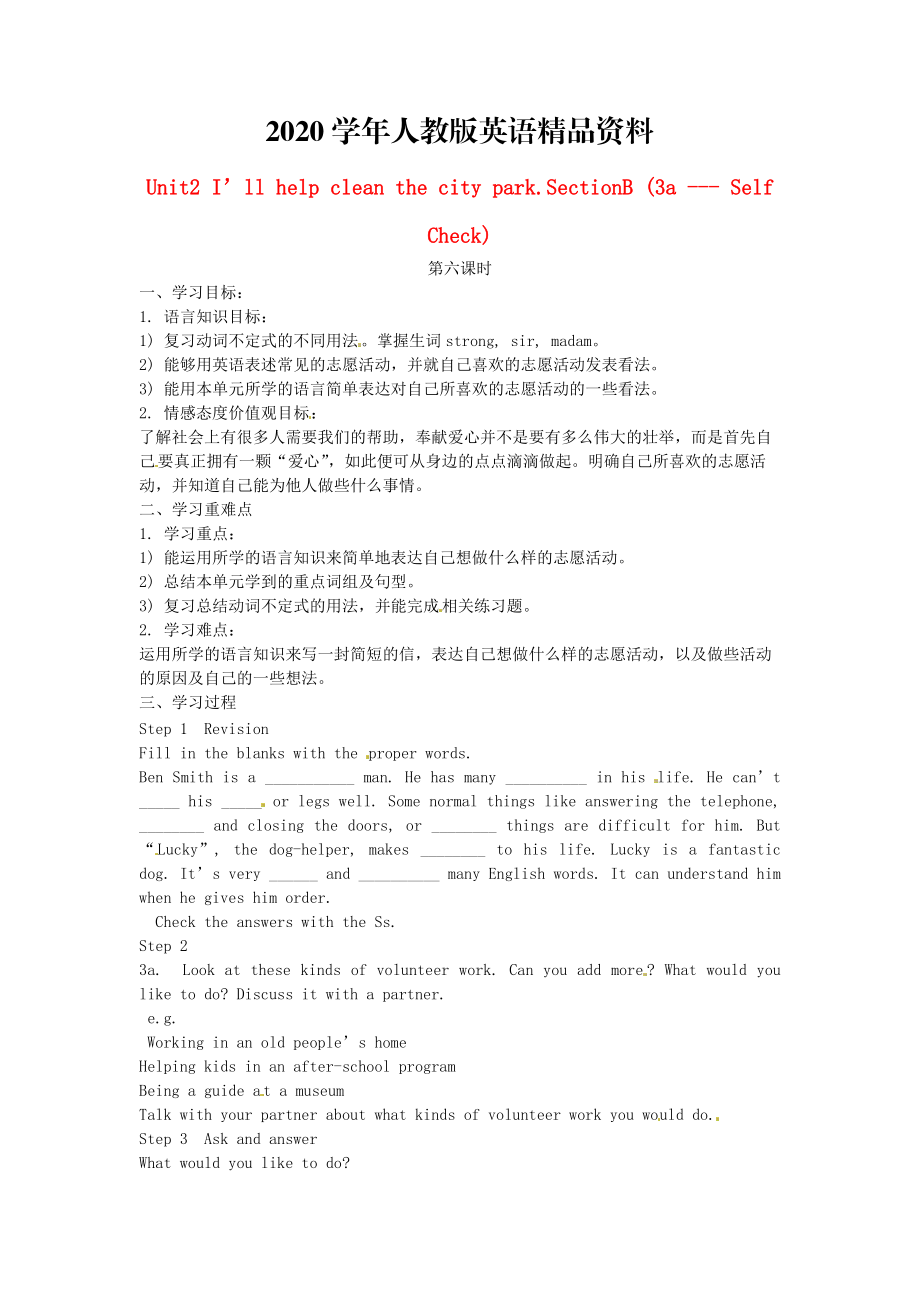《2020【人教版新目標(biāo)】八年級英語下冊Unit2 I’ll help clean the city park.SectionB (3aSelf Check)》由會員分享���,可在線閱讀�����,更多相關(guān)《2020【人教版新目標(biāo)】八年級英語下冊Unit2 I’ll help clean the city park.SectionB (3aSelf Check)(3頁珍藏版)》請?jiān)谘b配圖網(wǎng)上搜索����。
1�����、2020學(xué)年人教版英語精品資料
Unit2 I’ll help clean the city park.SectionB (3a --- Self Check)
第六課時(shí)
一�、學(xué)習(xí)目標(biāo):
1. 語言知識目標(biāo):
1) 復(fù)習(xí)動詞不定式的不同用法。掌握生詞strong, sir, madam�。
2) 能夠用英語表述常見的志愿活動,并就自己喜歡的志愿活動發(fā)表看法����。
3) 能用本單元所學(xué)的語言簡單表達(dá)對自己所喜歡的志愿活動的一些看法。
2. 情感態(tài)度價(jià)值觀目標(biāo):
了解社會上有很多人需要我們的幫助�,奉獻(xiàn)愛心并不是要有多么偉大的壯舉���,而是首先自己要真正擁有一顆“愛心”,如此便可從身邊的
2�����、點(diǎn)點(diǎn)滴滴做起�����。明確自己所喜歡的志愿活動�����,并知道自己能為他人做些什么事情����。
二�����、學(xué)習(xí)重難點(diǎn)
1. 學(xué)習(xí)重點(diǎn):
1) 能運(yùn)用所學(xué)的語言知識來簡單地表達(dá)自己想做什么樣的志愿活動�。
2) 總結(jié)本單元學(xué)到的重點(diǎn)詞組及句型。
3) 復(fù)習(xí)總結(jié)動詞不定式的用法�����,并能完成相關(guān)練習(xí)題。
2. 學(xué)習(xí)難點(diǎn):
運(yùn)用所學(xué)的語言知識來寫一封簡短的信���,表達(dá)自己想做什么樣的志愿活動�����,以及做些活動的原因及自己的一些想法����。
三���、學(xué)習(xí)過程
Step 1 Revision
Fill in the blanks with the proper words.
Ben Smith is a __________
3����、_ man. He has many __________ in his life. He can’t _____ his _____ or legs well. Some normal things like answering the telephone, ________ and closing the doors, or ________ things are difficult for him. But “Lucky”, the dog-helper, makes ________ to his life. Lucky is a fantastic dog. It’s very __
4����、____ and __________ many English words. It can understand him when he gives him order.
Check the answers with the Ss.
Step 2
3a. Look at these kinds of volunteer work. Can you add more? What would you like to do? Discuss it with a partner.
e.g.
Working in an old people’s home
Helping
5、kids in an after-school program
Being a guide at a museum
Talk with your partner about what kinds of volunteer work you would do.
Step 3 Ask and answer
What would you like to do?
Why do you like to do that?
Step 4 Writing
Work on 3b:
1. Let one student write his or her answer to the q
6�、uestions.
2. Using these answers as a model, write a short letter as a model for the Ss.
寫作指導(dǎo):
本文為寫自己所喜歡的志愿活動,并說明原因�����。
Step 5 Self Check
Work on Self Check 1:
1. Fill in each blank with a possible verb to make a phrasal verb.
2. Fill in the blanks and try to say the meaning of it.
7、
3. Make a new sentence with each phrase.
Work on Self check 2
1. Tell Ss to read the short passage and fill in the blanks with the appropriate phrasal verbs or infinitives.
2. Tell Ss should try to read the short article first and try to know the main meaning. Then read carefully and try t
8�、o understand the meaning of each blanks.
3. Ss work and by themselves and try to fill in the blanks.
4. Check the answers with the class.
Step 6 Exercises
If time is enough, do some more exercises on big screen.
Homework
Finish the letter or e-mail in 3b, using the useful sentences.
反思:
9、
�Unit2 I’ll help clean the city park.
SectionB (Exercise)
第七課時(shí)
Step 1 Exercise:
Ⅰ. Fill in the blanks.
1. He made me __ (tell) him all the things.
2. Please remember ______ (water) the plants while I’m away.
3. Let’s (watch) a talk show.
4. What can you expect
10�、 (learn) from the news?
5. My parents want me _____ (be) a doctor.
6. I’d like _______ (watch) cartoons at home.
Answers: tell, to water, watch, to learn, to be, to watch
Ⅱ. Complete the sentences.
1. Who will _______________ (自愿讀) these words for us?
2. The girl often _____ he
11、r mother ______ the dishes (幫媽媽洗餐具) on weekends.
3. We ______her ________ (邀請來) to our party.
4. The old man had ______________ (無事可做) every day.
Answers: volunteer to read, helps / do, asked / to come, nothing to do
Step 2 Exercises
Ⅰ. Fill in the blanks using the words in the box.
sev
12�����、eral, feeling, owner, journey, satisfaction
1. I only want to sleep for _______ minutes.
2. The _______from London to Oxford takes about an hour and a half.
3. The next morning, the _____ of the house prepared the breakfast for us.
4. He looked at his work with a smile of ________________.
5. She enjoys the ________ of freedom.
Ⅱ. Complete the sentences.
1. My brother wants _______ (be) a pilot.
2. You’ll never learn ________ (ride) a bike if you don’t practice.
3. Mike taught his grandpa how________ (use) the computer.
 2020【人教版新目標(biāo)】八年級英語下冊Unit2 I’ll help clean the city park.SectionB (3aSelf Check)
2020【人教版新目標(biāo)】八年級英語下冊Unit2 I’ll help clean the city park.SectionB (3aSelf Check)

